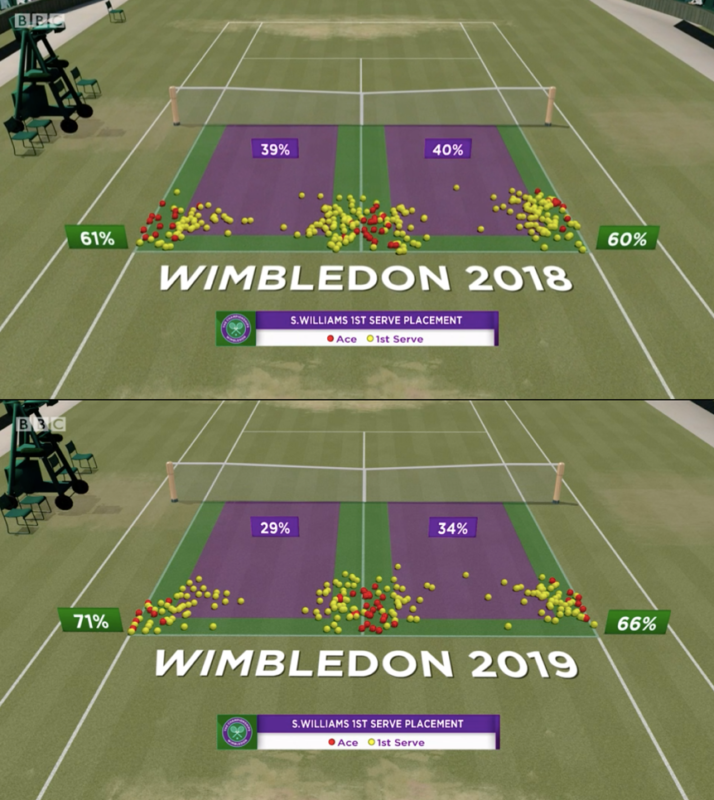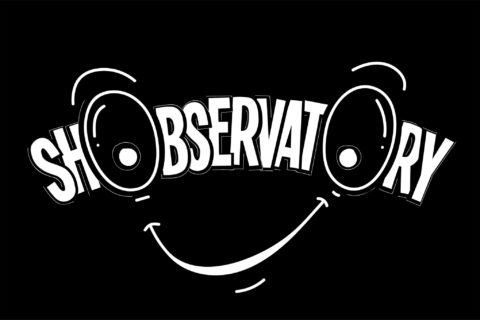During the Wimbledon Championships a few weeks ago, I sat in my hot living room (we were having a heatwave in the UK) watching as the powerhouse that is Serena Williams delivered serve speeds of over 100 mph.
The pundits talked among themselves comparing her serve performance of today with that of last year, and the year before.
They displayed a graphic of her side of the tennis court. Blue dots showed the pattern of her physical movements that day so far, and in yellow, the difference between her foot placements in 2018. “She’s less afraid to move away from centre of the court this year” they said. They also compared her scores by game duration– what was Serena’s performance like 30 minutes into the game last year versus this year?
What these commentators were discussing, in great detail, is data.

Games and data have always been synonymous.
What is a win score? Data. What is a leaderboard? Data. What are XP points? Data. How do you determine who’s won Monopoly? You count the money and assets – data.
Data is such a crucial component of games, as sport, competition or otherwise, that games cannot be played without it. When people play any kind of game, they need data not just for the win today, but to better strategize, perform and play for tomorrow.
So games and data have always lived contemporaneously.
But now, the union of games and data is becoming even more important and valuable. We’re at an interesting point in human history; survival is no longer about our basic needs of food and shelter. Survival and growth is rooted in engagement and data. If you can captivate people in just the right way, your business grows. Your personal brand grows. Your likes grow. And it is said that data is now the most valuable asset on our planet.
Society has driven us to think about engagement and data all the time for our sense of self-worth, success, and even for love (dating apps also use gamification and rely on data to match people). Engagement and data are the new currencies of our time.
So it’s fitting, and obvious, that games, which are commercially and scientifically the most engaging medium of all time [1], and collect data through how we play, should become a focal point in the market research community. Play is a data generator.
What about research?
As market researchers, it’s our job to know about all the methods of data collection. And how to engage people. Games and gamification are two massively growing mediums being used for both those things in a myriad of industries.
There are ExerGames (exercise/fitness games), Training Games, AdverGames (games as adverts/marketing tools), and by my own invention, ResearchGames. The game-based learning market alone is said to be worth $17 billion by 2023, with an all-time high of $1.7 billion worth of investment going into EduGames (educational games) in the last two years [2].
The gamification market as a whole (gamification is where any application, business or method uses game techniques for typically non-game activities or tasks) was valued at $6.8 billion last year. It’s predicted to be worth $40 billion by 2024 [3]. Games and gamification, plus their unity with data, are literally changing the world in the way we interact with screens, with each other, and even how we shape the relationships we have with ourselves.
Indeed, these mediums are so much part of our day-to-day lives, it’s not just important for market researchers and insight specialists to know about these as data collection tools, but important for the general public as well.
And that’s why Research World and I have created this column ‘How Games and Data are Changing the World’, with each instalment having a different focus; Games and Gamification in…Employee Training. Games and Gamification in….Wellbeing. Games and Gamification in…Finance, and so on.
Does it sound far fetched to make this bold claim? That Games, and their coexistence with data, are changing the world? No.
Open your wallet or purse. Loyalty cards aplenty, right? Loyalty cards are perfect examples of gamification that collect data and they’re right there in your pocket, all day, every day. Data collected on everything you buy, where you bought it, your average spend, the times you shop, what you shop for, right down to your psychological make up as a consumer. There are at least 200 data points on you as a consumer.
Did you complete 10,000 steps today and look at a fitness app? Gamification and data. Did you reward your kid with a gold star for good behaviour? Gamification and data. Did you take an online quiz to discover which Disney princess you are? Gamification and data.
It’s everywhere and shaping our lives; sometimes with positive outcomes, and sometimes to our detriment.
And so that’s what this every-6-week column will put under the spotlight and discuss – not just ‘here’s what’s happening with Serious Games and Gamification’ but the impact on people’s lives, on businesses, and on entire industries.
I’ll also look at how games and gamification will evolve to collect other types of data from us in the future with the rise of AI, AR, and VR, and unpack the ethics of these mediums which are not formally recognised as tools for market research, but are being used to collect data and understand people nonetheless.
I hope the journey into these new worlds are as eye-opening and thrilling for you as they are for me.
Join me in my next column in 6 weeks: Games and Gamification in…Marketing.
[1] In 2017, mobile games alone produced more revenue than any other form of entertainment, generating 40 billion USD worldwide. Again in 2017, people spent more money on all types of games than they did on movies and music combined, at an estimated revenue of 92 billion USD.
[2] www.gamesindustry.biz/articles/2018-08-08-metaari-game-based-learning-market-will-reach-usd17-billion-by-2023
[3] www.prnewswire.com/news-releases/global-gamification-market-was-valued-at–6-8-billion-in-2018-and-is-projected-to-grow-at-an-impressive-cagr-of-32-to-reach–40-billion-by-2024–300823218.html
This column is part of our #HowGamesAreChangingTheWorld series.
Each column focuses on the intersection between Games, Gamification and data.
Betty Adamou explores different issues, case-studies and industries where Serious Games and Gamification are being applied.



2 comments
Hi Cat
Hello to you in Colombia from here in a rainy part of England 🙂
I’d love to hear more about gamified ethnology. Do you have a video, blog, article, paper (any publication) you’ve put out publicly?
And yes, please do feel free to keep track of the columns! They’ll all be housed under the bit.ly/GamesAndDataColumn link 🙂
Betty
Hi Betty! Can’t be more agree with you. I’m from Colombia and I apply “gamified ethnology” in my own framework. Will be nice to keep your track!